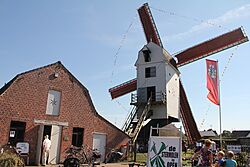Hechtel-Eksel facts for kids
Quick facts for kids
Hechtel-Eksel
|
|||
|---|---|---|---|
 |
|||
|
|||
| Country | Belgium | ||
| Community | Flemish Community | ||
| Region | Flemish Region | ||
| Province | Limburg | ||
| Arrondissement | Maaseik | ||
| Area | |||
| • Total | 76.70 km2 (29.61 sq mi) | ||
| Population
(2018-01-01)Lua error in Module:Wd at line 1575: attempt to index field 'wikibase' (a nil value).
|
|||
| • Total | Lua error in Module:Wd at line 1,575: attempt to index field 'wikibase' (a nil value). | ||
| Postal codes |
3940-3941
|
||
| Area codes | 011 | ||
| Website | www.hechtel-eksel.be | ||
Hechtel-Eksel is a town in Belgium. It is located in the Limburg province. This area is in the northern part of Belgium. As of 2018, about 12,290 people lived there. The town covers an area of 76.70 square kilometers.
Hechtel-Eksel was formed in January 1977. It was created by joining two older towns: Hechtel and Eksel.
Contents
Fun Events in Hechtel-Eksel
Hechtel-Eksel is known for some exciting events. One big event was the "KBC Night of Athletics". This was a yearly international sports meeting. Athletes from all over the world came to compete.
Another popular event is the International Airshow. It takes place every September. This airshow is held at Sanicole Airport. You can see amazing planes and flying displays there.
Hechtel-Eksel During World War II
The Battle of Hechtel
Hechtel-Eksel played an important role in World War II. For seven days in September 1944, the town was a battleground. This event is known as the Battle of Hechtel. It happened between September 6 and September 12, 1944.
German and British soldiers fought fiercely here. The German troops were from the 2nd Hermann Göring Tank Regiment. British forces included the 1st and 2nd Battalions of the Welsh Guards. Other units like the Irish Guards and Scots Guards also took part.
During the battle, many lives were lost. Sixty-two British soldiers and 127 German soldiers died. About 250 German soldiers were captured. Sadly, 35 civilians also lost their lives. The center of the town was badly damaged.
The battle ended on September 12. The Irish Guards managed to get around the German forces. They took control of a key bridge. This action helped to cut off the German troops.
Remembering the Past
A German tank destroyer from this battle is now on display. You can see it at the Imperial War Museum Duxford. This tank was knocked out during the fighting.
The Battle of Hechtel is remembered every year. A special event takes place on the second Sunday of September. This helps people remember the history and those who were involved.
A famous Anglican priest named Hugh Lister also died in Hechtel. He served as an officer with the Welsh Guards during the war.
See also
 In Spanish: Hechtel-Eksel para niños
In Spanish: Hechtel-Eksel para niños




